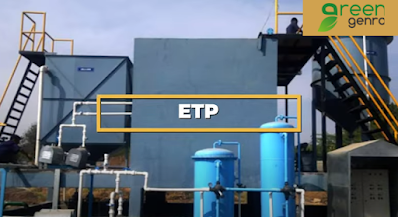Effluent Treatment Plant is one of the best setups to treat wastewater and not only treat it but process it in such a way that it can be re-used and safely re-enter the environment without any hazardous tendency. An efficient plant not only helps you in remaining within the applicable compliance standards but also makes the best use of the water resources too. It not only treats industrial sewages and waste but also works great with domestic sewage. In this blog, we will see how ETP works in a very lucid manner and if you are searching for the top ETP plant Manufacturer and suppliers, then one name that you can trust with ease is Green Genra.
The first stage is the screening stage when big materials are removed from the influent to avoid damage to the facility's pumps, valves, and other equipment. The treatment and reclamation of wastewater (any water that has been used in homes, such as flushing toilets, washing dishes, or bathing, as well as some water from industrial use) begin with the expectation that it will be clean enough to reenter the environment once it has been treated.
The separation of solid organic materials from wastewater is the second stage. Solids, also known as organics/sludge, tend to settle to the bottom of the tank and must be pumped to a sludge digestor or maybe a sludge processing facility, where it is dried and carted away. The right settling rate is one sign that may be observed. The operator may change the settling rates and efficiency by adjusting the flow rate into the clarifier.
Encouragement and acceleration of the natural process of bacteria breaking down organic material is the next and most crucial phase in the wastewater treatment process. The aeration tank is the focal point for this activity. The aeration tank's principal role is to pump oxygen into the tank to stimulate the breakdown of any organic material (and the development of bacteria), as well as to guarantee that the organic material has adequate time to break down. Pumping and defusing air into the tank or strong agitation that adds air to the water are two ways to achieve aeration. This procedure is carefully orchestrated to provide the finest possible environment for bacterial development.
With the increased concentration of bacteria as a result of the aeration stage, it is necessary to test the effluent for bacteria and disinfect the water. This guarantees that no bacterium concentrations higher than those specified are introduced into the environment. Chlorination is the most prevalent and cost-effective disinfection method, however, ozone and UV disinfection are becoming more popular. If chorine is utilised, free-chlorine levels must be tested to verify they are below permissible limits before being discharged into the environment.
Although testing is carried out continuously throughout the wastewater treatment process to guarantee optimal water flow, clarity, and aeration, final testing is carried out to check that the effluent exiting the plant complies with permit requirements. Clean water is returned to the environment after completing all permit requirements.
Effluent Treatment Plants are important in the treatment of both industrial wastewater and home sewage and for more detailed assistance on any features of ETP or further queries, feel free to reach out to us at Green Genra.






